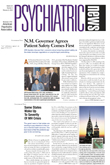Women who have experienced depression rate it as the primary barrier to success in the workplace, according to a survey by the National Mental Health Association (NMHA) and the American Medical Women’s Association.
According to the findings, depression or symptoms of depression interfered with work by increasing absenteeism and hampering job performance.
Researchers from Russell Marketing Research recruited a sample of 751 women from a national sample of more than 3,000 women who were screened for employment status and past or current depression with the Center for Epidemiological Studies Depression Scale.
Those chosen to participate in the survey had to be employed and report experiencing or having experienced symptoms of depression in the past.
Researchers conducted telephone interviews with the 751 women last April and May. They asked a variety of questions on such topics as work performance, treatment, and stigma.
Of those selected to participate in the survey, 501 women had been previously diagnosed with depression, but 250 women had never been formally diagnosed with the disorder.
A little less than half of the sample (45 percent) reported currently experiencing severe symptoms on a continuous basis over time, 27 percent reported experiencing mild symptoms, and 28 percent reported experiencing few or no symptoms at the time of the survey.
Among women who had been previously diagnosed with depression, 83 percent reported that depression was a leading barrier to success in the workplace and ranked it ahead of child- and elder-care responsibilities, sexual harassment, and gender discrimination.
Depression interfered with work in several ways, according to those surveyed. Almost three-quarters of the sample reported that depression caused them to be quiet and reserved. Almost as many (64 percent) said it caused them to be unmotivated at work. A total of 57 percent of women surveyed said they were more prone to job-related mistakes due to a lack of sleep.
Almost half (45 percent) of the sample said they had difficulty making it to work. The average number of days that depressed women are absent from work a year is twice as high as that for women workers in general (10.6 days versus five days). The number of work days lost to depression is linked to severity of symptoms—2.7 days a year for women with minimal or no symptoms to 9.5 days for women with mild to major symptoms.
Three out of 10 women reported having quit or lost a job while depressed, mainly due to symptoms of depression, according to the study.
Of the 501 women diagnosed with depression, 64 percent were taking a psychotropic medication at the time of the survey, and 58 percent were taking medications and undergoing psychotherapy.
Of the women who were diagnosed with depression, just half (47 percent) sought help “right away,” according to the survey. Reasons for not seeking help immediately ranged from thinking they could handle the symptoms on their own to viewing depression as “something you have to live with” or viewing the symptoms of depression as a sign of weakness.
“Although the stigma associated with depression is decreasing, it continues to be a major factor in preventing women from seeking treatment,” said Lea Ann Browning McNee, senior vice president of public affairs and community development at the NMHA, in a press release.
The study was funded by Wyeth Pharmaceuticals.
More information about the study, “Depression Among Working Women Number One Barrier to Success,” is posted online at www.nmha.org/newsroom/surveys.cfm. ▪
